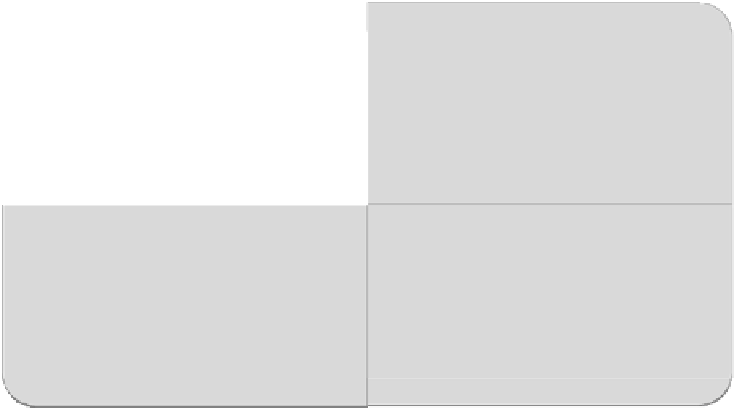Information Technology Reference
In-Depth Information
•
The basic characteristic of an intelligent agent is its autonomy. Each agent takes
its own decisions, based on its internal state and the information that it receives
from the environment. Therefore, agents offer an ideal paradigm to implement
real-world systems in which each component models the behaviour of a separate
entity, which wants to keep its autonomy and independence from the rest of the
system (
e.g.,
each unit of the hospital may keep its private data, or each hospital
may use a different policy to rank the patients that are waiting for an organ
transplant).
Moreover, Fox
et al.
[19] identified other benefits of applying agents to healthcare
problems. On the one hand, agent technology offers advanced platforms for building
expert systems to assist individual clinicians in their work. On the other hand, distrib-
uted agent systems have the potential to improve the operation of healthcare organisa-
tions, where failures of communication and coordination are important sources of
error.
3.2 Fields of Application of Agents in Healthcare
The reader can find numerous applications of agents in healthcare. From an analysis
of those works, Figure 1 summarises several domains of healthcare in which agent
technology has been applied. The figure also presents some of the most relevant
works performed in each area, which are briefly introduced in this section.
Decision support system
DSS obtained from the collaboration of
different participants
(Godó, et al., 2003), (Singh, et al., 2005),
HealthAgents (González-Vélez, et al., 2009),
HeCaSe2 (Isern, 2009)
Medical Data Management
Integration of heterogeneous sources
NeLH (Koskova et al, 2003),
VEPR (Cruz-Correia, et al., 2005),
CHIS (Rodríguez, et al., 2005), (Choe and Yoo, 2006)
Fields of
application
Elder and disabled citizens
Hybrid systems that combine different AI
techniques
SHARE-IT (Cortés et al, 2008)
K4Care (Campana et al, 2008),
Geriatric Ambient Intelligence (Corchado, et al., 2008)
INCA project (Beer, et al., 2003)
Distributed Planning and scheduling
Distributed planning applications of resources
Agent.Hospital (Becker & Krempels, 2003),
CARREL (Vázquez-Salceda et al, 2003),
Medical Information Agents (Braun, et al., 2005),
Operations Management in Healthcare (Litvak, et al., 2008)
Fig. 1.
General overview of main fields where agents have been applied
Medical data management
. Systems focused on the retrieval and processing of medi-
cal data, such as distributed electronic healthcare records and Web resources. These
systems integrate several (heterogeneous) sources that are accessed in a transparent
way by a user, or by another decision support system. This approach permits to

































Search WWH ::

Custom Search